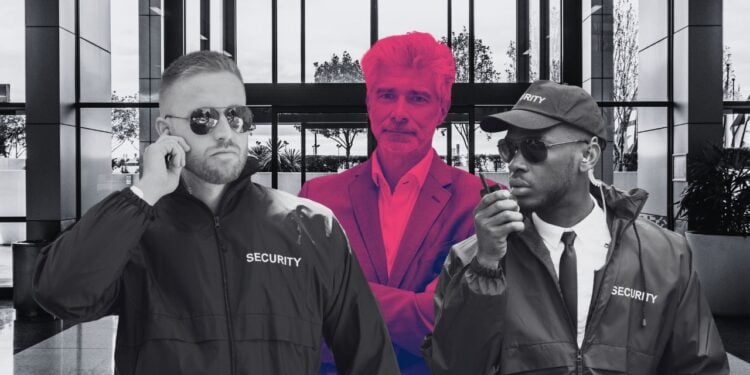On Dec. 4, the CEO of UnitedHealthcare Brian Thompson was shot and killed in the streets of Manhattan.
The alleged assassin, Luigi Mangione, has since been caught and charged with murder.
While the man-hunt for the suspect has ended, the impact of his actions is still looming large in boardrooms.
The apparent ripple effects from the murder Thompson, a highly paid, influential CEO, have moved well beyond the health insurance sector and could have lasting implications for the future of work and corporate behavior.
Leaders Are Seeking Greater Privacy and Security
Already, many “About Us” pages have been removed from the websites of some of the largest corporations in America, including many healthcare companies. UnitedHealthcare’s parent company UnitedHealth quickly removed its executive leadership page after Thompson’s death, and executive pages for a number of Blue Cross Blue Shield plans have also been taken down.
Centene and CVS, the parent company of Aetna, have kept executive biographies but removed top officers’ headshots.
Many major companies are also now hiring “protection managers.” Thompson’s death has prompted organizations across various sectors to reassess their security protocols and measures for safeguarding top executives more broadly, according to Forbes.
Companies like Amazon have posted job listings for executive protection managers, who are responsible for ensuring the safety of senior leaders during business travel.
A LinkedIn posting from Amazon seeks an “Executive Protection Manager” to join a team tasked with both active and passive security measures. Similarly, BlackRock recently reposted a job listing for a vice president, executive protection specialist.
“The reach-out from companies in the last two days has been very urgent,” Glen Kucera, the head of Allied Universal’s enhanced protection services unit, told CNN. “It’s been eye-opening to a lot of companies in how they go about protecting their executives.”
Many high-level CEOs have already had in place robust security measurements; no doubt they will increase them now, too.
In 2023, security costs for Mark Zuckerberg (CEO of Meta, Instagram, WhatsApp, and Threads) were nearly $24.4 million.
A New Standard for Executive Security?
With growing concerns around privacy, safety, and the increasing risks posed to high-profile figures, it’s plausible that we will see more CEOs following suit by hiring personal security teams and adopting stricter privacy policies.
Is this the end of the traditional “About Us” pages for leadership?
It seems likely that the trend of removing leadership pages will continue as companies reassess privacy and security. This may not be a temporary change, but become part of a longer-term strategy to protect executives.
As security becomes more integral to the role of a CEO, more businesses may need to start accounting for personal security budgets in their financial planning.
The death of Thompson has shed light on how quickly security measures can be put to the test, and how essential it is for companies to be prepared.
For 2025 and beyond, it may be necessary for CEOs to have dedicated budgets for their safety, just as they have for travel and communications.
This is shaping up to be a new standard in executive security.
As security threats progress, companies will increasingly prioritize protecting their leaders — potentially making privacy and security a part of the corporate DNA.
Beyond Security, What More Can CEOs Do to Protect Themselves?
A massive aspect to consider is why this backlash is being targeted at CEOs, and if there is perhaps some action corporate leaders could take to make the public less angry.
There is clearly growing negative sentiment towards those in power, particularly those who may appear to profit from the suffering of others.
“Thompson’s killing looks to be a premeditated attack linked to his role in pulling in record profits for UnitedHealthcare at the cost of patients’ lives and wallets,” according to The Hill.
Thompson was in New York for an investors’ meeting, with UnitedHealth poised for another profitable year.
Despite $371 billion in revenue, much of its profit stemmed from denying claims — 32% of all claims, double the industry average — reportedly putting lives at risk while politicians, executives, and investors seemingly overlook the financial and personal cost to families.
During this tumultuous week in the world of U.S. health insurance, it also came to light that large insurer Anthem Blue Cross Blue Shield announced that it intended to no longer pay for anesthesia care in certain states if the procedure went beyond a particular time limit. It has since reversed that decision after monumental backlash, which was also after UnitedHealthcare’s CEO was assassinated.
The power of public sentiment continues to rise, and business leaders received a reminder of that in the starkest terms after Thompson’s murder ignited not-so-friendly commentary online.
On the Reddit thread r/Foodforthought, one user said “For critical care companies, even a billion in profit can feel like ‘not enough’ for CEOs and stockholders. But every extra billion often means denied claims or inflated costs, which can result in lives lost. Profit is important, but when it outweighs patient care, the system fails and is failing those who need it most.”
Beyond increasing security for themselves, CEOs and companies in general may need to evaluate how they operate, and the impact increasing profits has on the general public.

















